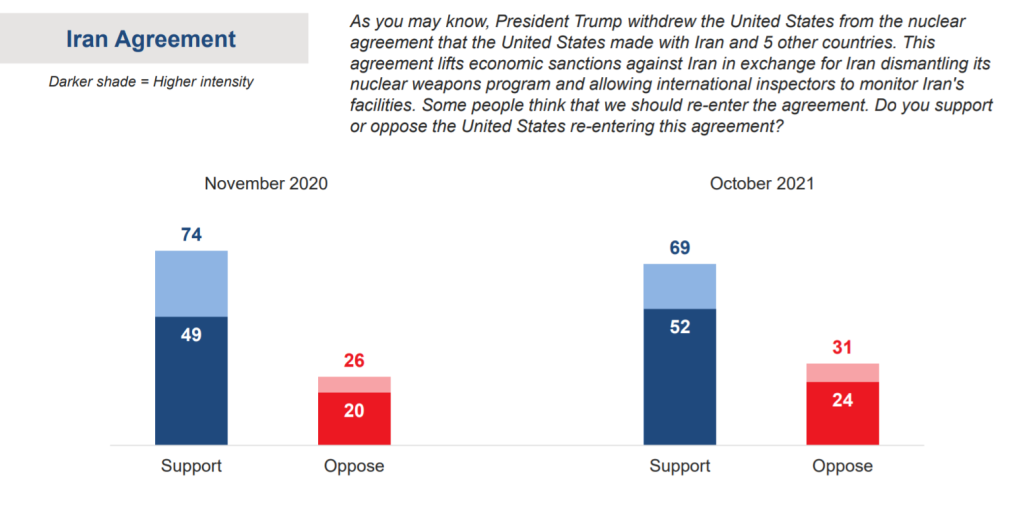Securing an urgent return to the JCPOA is the only way to reduce tensions, reimpose necessary restraints on Iran, and prevent a dangerous slide toward escalation and armed conflict.
As the United States has worked to restart negotiations with Iran in the wake of President Trump’s disastrous violation of the JCPOA and failed ‘maximum pressure’ approach, the Biden administration and lawmakers can be confident that substantial public and political support exists for a negotiated agreement to curb Iran’s nuclear activities. Polling has consistently shown that a large majority of Americans support diplomacy with Iran, support the JCPOA, and oppose a reliance on ‘maximum pressure’, military force and endless wars to address foreign policy challenges.
According to a recent poll from The Chicago Council on Global Affairs, majorities of the overall public (59%), self-described Democrats (72%), and Independents (63%)—and four in 10 self-identified Republicans (41%)—would support U.S. participation in a deal that lifts economic sanctions on Iran in exchange for limits on its nuclear program.
Participation in the Iran Nuclear Deal
Based on what you know, do you think the United States should or should not participate in the following international agreements? The agreement that lifts some international economic sanctions against Iran in exchange for strict limits on its nuclear program for at least the next decade (% should participate)
The views of the American Jewish community are even more enthusiastic than the general public when it comes to support for diplomacy and a return to the JCPOA or a similar diplomatic agreement. October 2021 polling of Jewish voters commissioned by J Street found a very strong preference for diplomacy over so-called “maximum pressure” and the use of force. They want the United States to continue pursuing diplomacy, with 69 percent supporting the United States re-entering the agreement, and 65 percent wanting to continue diplomacy and work to an agreement without resorting to force or imposing new sanctions, compared to 30 percent who want to resume Trump’s “maximum pressure” policy that increases sanctions to try forcing Iran to accept our terms. Only 5 percent support the use of military strikes.
Support for reentering the Iran nuclear deal (JCPOA)

This trend of general support for diplomacy and opposition to the “maximum pressure” approach adopted by Trump is not new. At the time of the Trump administration’s withdrawal in 2018, a poll conducted by CNN found that almost two-thirds of Americans – 63% – believed that the U.S. should not withdraw from the JCPOA.
![]()
By and large, the American public is opposed to military interventions to carry out foreign policy goals, widely supporting diplomacy instead. According to polling commissioned by the Center for American Progress, 64% of Americans, including 78% of Democrats and 70% of Independents, agreed that the U.S. should get out of costly and ineffective wars in the Middle East and shift these defense savings into other areas of our national security, including intelligence, cybersecurity, and diplomatic efforts.
![]()
Simply put: diplomacy with Iran is good policy, and good policy makes for good politics.

